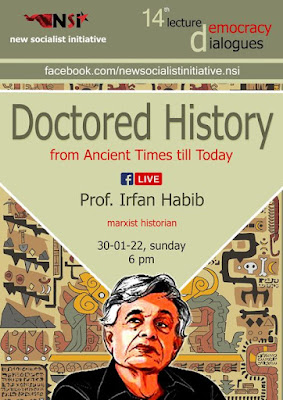Democracy Dialogues Lecture Series (Online )
Organised by New Socialist Initiative
15th Lecture
Topic: 'Secularism, Communalism and Indian Politics Today'
Speaker: Prof. Achin Vanaik
Date and Time: 27th February 2022 at 6 PM (IST).
Facebook Live on - http://fb.com/newsocialistinitiative.nsi
Join @ Zoom - https://us02web.zoom.us/j/84326405031?pwd=aEdqL1c1ZElYeVJiUm9qRzNRaXhhdz09
Meeting ID: 843 2640 5031
Passcode: 051955
Summary
The presentation will start with a series of
definitions of crucial concepts such as secular, secularization,
secularism as well as distinguishing between religious
fundamentalism, religious nationalism and communalism. This is important to
get a handle on how the widespread Indian understanding of secularism as
an ancient form of ‘tolerance’ is dangerously mistaken. Of course the
rise of the political right and far-right is a global phenomenon in the
last few decades giving rise to different forms of what can be called the
‘politics of cultural exclusivism’. So the first principle of
explanation for this rise has also to be transnational. After this the
question of the rise of the Sangh/BJP in the wider context of developments
in India over time will be taken up. It is obvious that the Sangh/BJP is
seeking to expand its existing power and influence i.e., to establish and
expand its hegemony and this must be understood as well as what are the
projects central to its efforts to establish a Hindu Rashtra or Nation. It
should be obvious that its particular conception of how to secure a
strong Indian nation/nationalism must be exposed and combated. The
presentation will end with recognising that this is a long term struggle and
how we must go about it.
About The Speaker
Writer and Social Activist, Former Professor of Political Science at Delhi University Prof Achin Vanaik is a fellow of the Transnational Institute.
He is author of numerous books including The
Furies of Indian Communalism ( 1997) , The
Painful Transition : Bourgeois Democracy in India ( 1990) , Hindutva
Rising – Secular Claims, Communal Realities (2017), “Nationalist
Dangers, Secular Failings:A Compass for an Indian Left”
About the Democracy Dialogues Series :
The idea behind this series - which we would like to call 'Democracy Dialogues' - is basically to initiate as well as join in the on-going conversation around this theme in academic as well as activist circles.
We feel that the very idea of democracy which has taken deep roots across the world, has come under scanner for various reasons. At the same time we have been witness to the ascendance of right-wing forces and fascistic demagogues via the same democratic route. There is this apparently anomalous situation in which the spread and deepening of democracy have often led to generating mass support for these reactionary and fascistic forces.
Coming to India, there have been valid concerns about the rise of authoritarian streak among Indians and how it has helped strengthen BJP's hard right turn. The strong support for democracy here is accompanied by increasing fascination towards majoritarian-authoritarian politics. In fact, we would like to state that a vigorous electoral democracy here has become a vehicle for hindutva-ite counterrevolution.
All videos of the Democracy Dialogues series lectures are available on New Socialist Initiative YouTube channel











